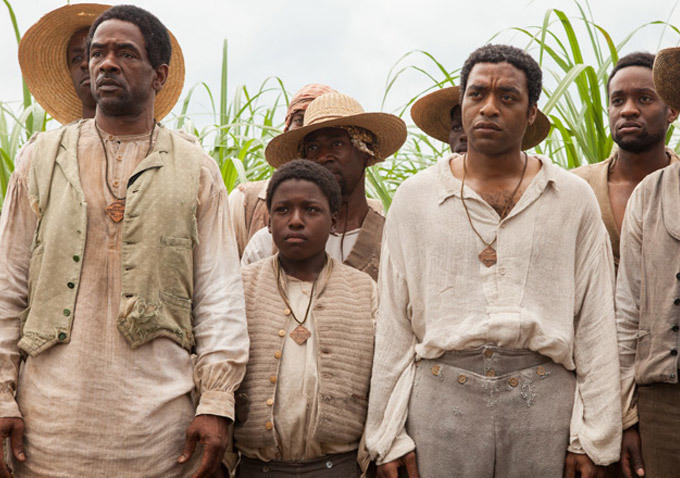
A friend recently echoed the typical response I hear from people who have seen the film 12 Years a Slave: “I was moved.” Maybe they’re afraid to say too much because it’s about racism. But the response to the film that resonates best with me is, “I will never look at this country the same way again.” I never will, either.
Twelve Years a Slave is not Disneyfied or glossed over. It’s not a beautiful movie about the “Great South” with lavish costumes, grand balls, and white war heroes. It’s not made for people to laugh at. You won’t leave the theater saying, “Oh my God, I loved that movie!” It’s just one man’s story, but it makes you imagine how horrible life had to have been for millions of others who lived exactly like him for hundreds of years. They built much of the foundation and wealth of this country in absolute misery and for free.
Twelve Years a Slave is based on the memoir of Solomon Northup, a black man born free in upstate New York who was kidnapped—leaving behind his family, his career as a respected musician, and a good life—and sold into slavery. He remained a slave for 12 years.
The opening scenes offer something we never see on any screen: a black man and a black woman—Solomon and his wife—just lying face to face intimately, looking into each other’s eyes, and speaking quietly. When I watched Solomon get captured and have his freedom taken away, it was personal. I felt like I knew him. I thought about the older generations in my family—Granny, who was our matriarch, her daughter and my cousin, Mary Lou, Granddaddy, or Cousin Sarah—and how Solomon Northup could have been a grandparent to any one of them. His strength was the strength of my family. The first time he was beaten after being captured, every strike he took felt to me like the attempts that have been made to break the spirit of my family, of black people.
The film’s power lies in the details we never see in movies: How the master’s life spilled over into the slaves’ lives. How slaves waited around for punishment without chains—but with nowhere to run. The tags slaves had to wear if they left the plantation. Being forced to sing while working or getting lashed.
In one scene, Solomon starts to run away but stumbles upon a group of white men with guns; they are presiding over black men whose necks are in nooses. Solomon can barely breathe or speak as they look over the pass he has to wear whenever he leaves the plantation. These men are getting ready to hang black men, but it’s so routine that they still pause to ask what Solomon is doing and where he is going. It’s insane. And after they give Solomon permission to leave, he returns to the plantation and continues his day like nothing happened.
Slavery was mental abuse on a mass scale—something I had never really considered before. The fear and the possibility of punishment everywhere, for everything. The women who could not defend their bodies from their masters’ sexual advances. They could not protect their children, either. The men could not protect their families. Their masters could interfere at any time and for any reason. I have said, “They would have to kill me if I was a slave because there’s no way.” But maybe not. Probably not. If I were born into slavery, I probably would have fallen in line to survive, just like they did.
Twelve Years a Slave made me ask how hundreds of years of that mental abuse still affects us, and how those centuries created a culture that remains alive today for African-Americans. To come out of that conditioning and create as much as we have—and change world culture as much as we have—is astounding. I’m very proud of us. I’m proud of what we’re made of. And I’m humbled by my ancestors’ long and difficult history here.
How could I not honor them by not making sure I understand who they were?
Slavery has always been real to me, but I’ve never really known the facts. Watching Kunta Kinte in Roots was painful, but it didn’t stay with me as more than a story. For the first time, I feel a real need to know.
I’ve begun researching us—our history, my history. It’s difficult, and it makes me very angry, but it’s also empowering. To see slavery is to see this country differently. But it is still my country. And while I see the history of slave owners and what they did, I don’t really care about them. I’m concerned about black people. I’m concerned about how we’re still affected. I’m concerned about the state we’re in and how we’ll heal. And I know the key to any healing is acknowledging the truth and knowing who you are.




Send A Letter To the Editors